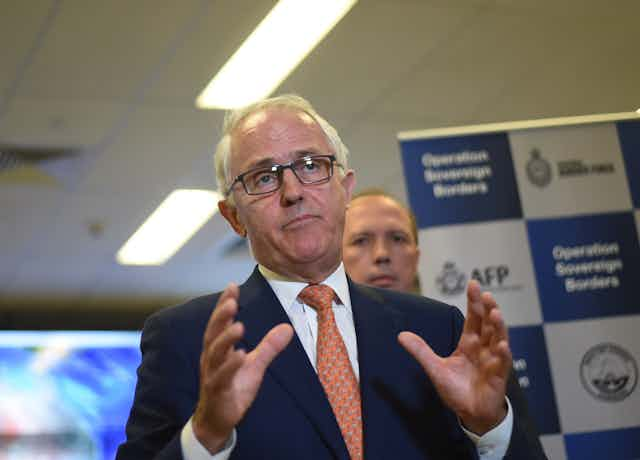The cordon around Australia’s border has been pulled tighter to deter people smugglers as the government finally unveils its agreement for the United States to resettle refugees from Nauru and Manus Island.
Extra navy, airforce and border protection forces have already been mobilised to stop the deal leading to the boats restarting.
Announcing the much-anticipated move to get the offshore refugees resettled in a third country, Prime Minister Malcolm Turnbull said priority would be given to women, children and families - meaning those on Nauru will be in the front of the queue, and the men on Manus at the back.
American officials will arrive imminently to begin the settlement work. The US authorities will do their own assessment and decide who is resettled. People will have to pass health and security checks for entry to the US.
Turnbull gave no deadline on getting the people resettled, with the government stressing the process would take time and be gradual. The prime minister said the agreement had been preceded by “months and months of very careful planning”.
The agreement covers only refugees currently on Nauru and Manus, plus those who have been brought to Australia for their own or a family member’s medical treatment. It would not extend to anyone who arrives in the future, or to those asylum seekers who have not been judged to be refugees. The government wants to latter to return to their home countries.
The Nauru centre will remain. Those who refuse to take the resettlement offer will get 20-year visas to stay on Nauru. Immigration Minister Peter Dutton said the treatment of people on this visa would be ‘“equal to that provided to Nauruan citizens prospectively. That will not include financial support from the Australian government but it will include, of course, ongoing support as is already provided for in terms of accommodation, health and education services”.
Following a court decision, Papua New Guinea is already committed to closing the Manus centre. Dutton said the offer would not be open to those who had already been resettled in PNG.
Saying the largest and most capable maritime operation had been put in place, Turnbull said the clearest, most unequivocal message needed to be sent to people smugglers.
“We anticipate that people smugglers will seek to use this agreement as a marketing opportunity”, he said.
The United Nations High Commissioner for Refugees welcomed the deal although it said it was not party to it.
“The approach taken by Australia in transferring refugees and asylum seekers to open-ended detention in Papua New Guinea and Nauru has caused immense harm to vulnerable people”, the UNHCR said.
The arrangement with the US reflected a much-needed long term solution for some refugees who had been held for over three years “and who remain in a precarious situation”.
“It is on this basis that UNHCR will endorse referrals made from Australia to the United States, on a one-off, good offices, humanitarian basis, in light of the acute humanitarian situation.” The full details of the agreement were not known, the UNHCR said.
“UNHCR remains gravely concerned about the fate of all vulnerable individuals in Papua New Guinea and Nauru. Appropriate solutions must be found for all of them”, the sharply-worded statement said.
Opposition leader Bill Shorten welcomed the agreement. However, Labor remains opposed to the legislation, now in parliament, for a lifetime ban on any people processed on Nauru and Manus since mid-2013 entering Australia. The US deal is not contingent on that legislation being passed.
The Human Rights Law Centre said that at the end of October there were 941 people on Nauru who had been accepted as refugees, and 675 on Manus.

